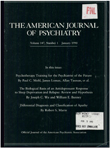Are psychiatric educators "losing the mind"?
Abstract
Psychiatry is part of medicine, and developing competence to deal with the mental life of patients is an essential part of general medical as well as psychiatric subspecialty education. As psychiatry's neurobiological data base, therapeutic armamentarium, scope of interest, and philosophical views expand and competitive pressures for time in residency training are intensified, teaching in the mental sciences and opportunities for residents to develop solid psychodynamic diagnostic and therapeutic skills are rapidly disappearing. However, brain science does not yet, and probably never will, fully explain the mind. The author urges psychiatric educators not to give up the mind or, worse yet, lose it by default.
Access content
To read the fulltext, please use one of the options below to sign in or purchase access.- Personal login
- Institutional Login
- Sign in via OpenAthens
- Register for access
-
Please login/register if you wish to pair your device and check access availability.
Not a subscriber?
PsychiatryOnline subscription options offer access to the DSM-5 library, books, journals, CME, and patient resources. This all-in-one virtual library provides psychiatrists and mental health professionals with key resources for diagnosis, treatment, research, and professional development.
Need more help? PsychiatryOnline Customer Service may be reached by emailing [email protected] or by calling 800-368-5777 (in the U.S.) or 703-907-7322 (outside the U.S.).



